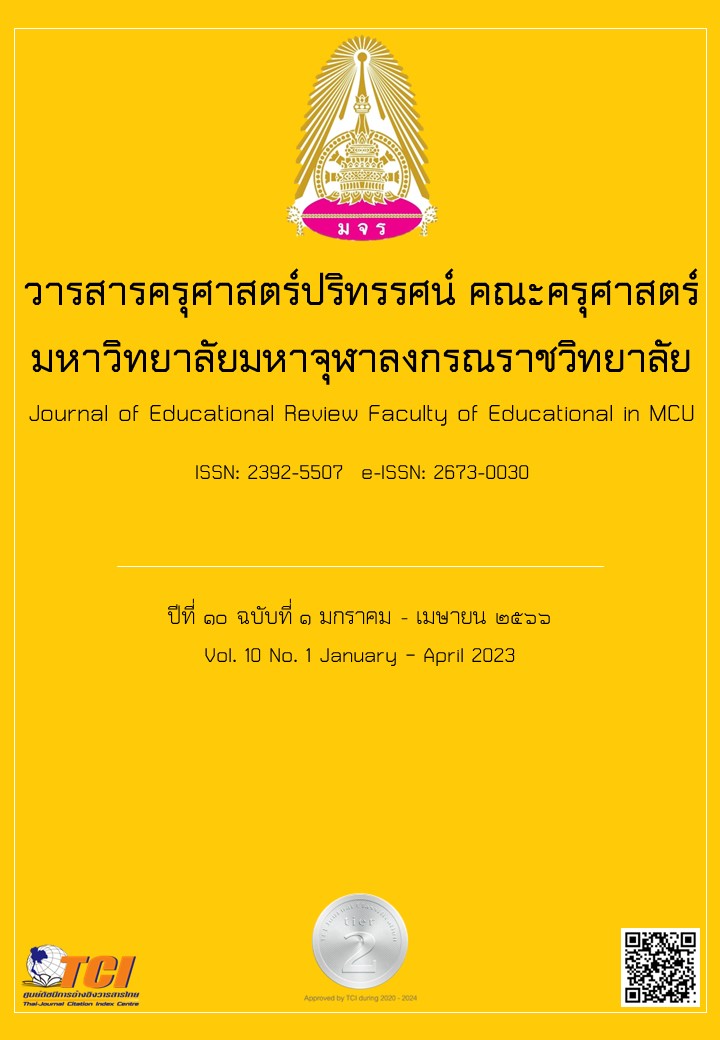GUIDELINES FOR THE DEVELOPMENT OF INNOVATION FOR LEARNING BUDDHISM IN THE DIGITAL AGE OF HIGH SCHOOL STUDENTS AT WAT SOTHON WARARAM SCHOOL CHACHOENGSAO PROVINCE
Main Article Content
Abstract
The purposes of this thesis were 1) To study the learning state of Buddhism in the digital age of secondary school students. Wat Sothon Wararam School Chachoengsao Province 2) to study methods for developing innovative learning in Buddhist subjects in the digital age of secondary school students. Wat Sothon Wararam School Chachoengsao Province 3) to propose guidelines for developing innovative learning subjects Buddhism in the digital age of secondary school students Wat Sothon Wararam School Chachoengsao Province. The study was mixed methods research between quantitative research and qualitative research. The quantitative data were collected from 96 administrators and teachers in Wat Sothon Wararam School by questionnaires, and data were analyzed by descriptive statistics including percentage, mean and standard deviation. Qualitatve data were collected using a schedule interview from 10 key informants as the administrators and teachers in Wat Sothon Wararam School, and content analysis was used for analyzing qualitative data. Results of the study were as follows: 1) Learning Buddhism subjects in the digital age of secondary school students Wat Sothon Wararam School Chachoengsao Province Overall, it was at a high level. The most practical aspect is teaching and learning innovation. and the aspect that had the least practice was curriculum innovation, respectively. Wat Sothon Wararam School Chachoengsao Province Modernize the curriculum and in line with the needs of the students Organize training for teachers in teaching and learning and production of teaching materials in accordance with teaching and learning in various forms so that teachers can apply knowledge to develop learners effectively. 3) Guidelines for the development of innovative learning in Buddhism subjects in the digital age of secondary school students at Wat Sothon Wararam School. Chachoengsao Province is that the school should improve the curriculum. as well as teaching and learning to be consistent with the changing context There should be a variety of teaching and learning activities. technology media production to be used in teaching And the measurement and evaluation should be consistent with the textbook and have a variety of forms of measurement and evaluation.
Article Details

This work is licensed under a Creative Commons Attribution-NonCommercial-NoDerivatives 4.0 International License.
ทัศนะและความคิดเห็นที่ปรากฏในบทความในวารสารฉบับนี้ถือเป็นความรับผิดชอบของผู้เขียนบทความนั้นเพียงผู้เดียว และไม่ถือเป็นทัศนะและความรับผิดชอบของกองบรรณาธิการ
กองบรรณาธิการขอสงวนสิทธิ์ในการคัดเลือกบทความลงตีพิมพ์และจะแจ้งให้เจ้าของบทความทราบหลังจากผู้ประเมินบทความตรวจอ่านบทความแล้ว
ต้นฉบับที่ได้รับการตีพิมพ์ในวารสารครุศาสตร์ปริทรรศน์ คณะครุศาสตร์ มหาวิทยาลัยมหาจุฬาลงกรณราชวิทยาลัย ถือเป็นกรรมสิทธิ์ของคณะครุศาสตร์ มหาวิทยาลัยมหาจุฬาลงกรณราชวิทยาลัย ห้ามนำข้อความทั้งหมดหรือบางส่วนไปพิมพ์ซ้ำ เว้นเสียแต่ว่าจะได้รับอนุญาตจากมหาวิทยาลัยฯ เป็นลายลักษณ์อักษร
References
กรมการศาสนา. (2550). หลักการบริหารและการจัดการวัดในยุคโลกาภิวัฒน์. กรุงเทพมหานคร: กรมการศาสนา.
กระทรวงศึกษาธิการ. (2552). สังคมศึกษา ศาสนา และวัฒนธรรม. กรุงเทพมหานคร: โรงพิมพ์ชุมนุมสหกรณ์การเกษตรแห่งประเทศไทย.
กู้เกียรติ แดงสีดา. (2563). ยุคดิจิทัลกับแนวทางการบริหารแหล่งเรียนรู้ในสถานศึกษาสังกัดสำนักงานเขตพื้นที่การศึกษาประถมศึกษาพิษณุโลก เขต 1. วิทยานิพนธ์ครุศาสตรมหาบัณฑิต. มหาวิทยาลัยราชภัฏอุตรดิตถ์.
จุฬาลักษณ์ การอรุณ. (2562). การพัฒนาผลสัมฤทธิ์ทางการเรียนวิชาพระพุทธศาสนา โดยใช้ทักษะ กระบวนการกลุ่มการเรียนรู้แบบร่วมมือ (Cooperative Learning) ของนักเรียนชั้นมัธยมศึกษาปีที่ 4/1. ขอนแก่น: โรงเรียนภูเวียงวิทยาคม.
ชัยวัฒน์ สุทธิรัตน์. (2559). 80 นวัตกรรมการจัดการเรียนรู้ที่เน้นผู้เรียนเป็นสำคัญ. พิมพ์ครั้งที่ 7. นนทบุรี: พีบาลานซ์ดีไซด์แอนปริ๊นติ้ง.
บุญชม ศรีสะอาด. (2543). การวิจัยเบื้องต้น. กรุงเทพมหานคร: สุวีริยาสาส์น.
พระสมพล กิตฺติเมธี (เชื้อกล้า). (2563). การจัดการเรียนรู้ออนไลน์ในยุคดิจิทัล รายวิชาหน้าที่พลเมือง วัฒนธรรม และการดำเนินชีวิตในสังคม ของนักเรียนชั้นมัธยมศึกษาตอนต้น โรงเรียนคอนสารวิทยาคม จังหวัดชัยภูมิ. วิทยานิพนธ์ครุศาสตรมหาบัณฑิต. มหาวิทยาลัยมหาจุฬาลงกรณราชวิทยาลัย.
Likert, Rensis. (1967). The Method of Constructing and Attitude Scale. in Reading in Attitude Theory and Measurement. Fishbeic Matin Ed. New York: Wiley & Son.


